Law for Business Managers: Government, Contracts, and Employment Law
VerifiedAdded on 2021/02/19
|11
|3455
|122
Report
AI Summary
This report provides a comprehensive overview of key legal concepts relevant to business managers. It begins by outlining the roles of the three main organs of government: the Executive, Judiciary, and Legislature. The report then delves into the remedy of specific performance in contract law, detailing its application and limitations imposed by the court, referencing relevant case law and legislation. A comparative analysis of general partnerships and companies follows, highlighting differences in separate legal personality and limited liability. The report concludes by examining the legal process of employee dismissal, offering practical insights for businesses. This report is a valuable resource for understanding the legal framework governing business operations, contract enforcement, and employment practices.
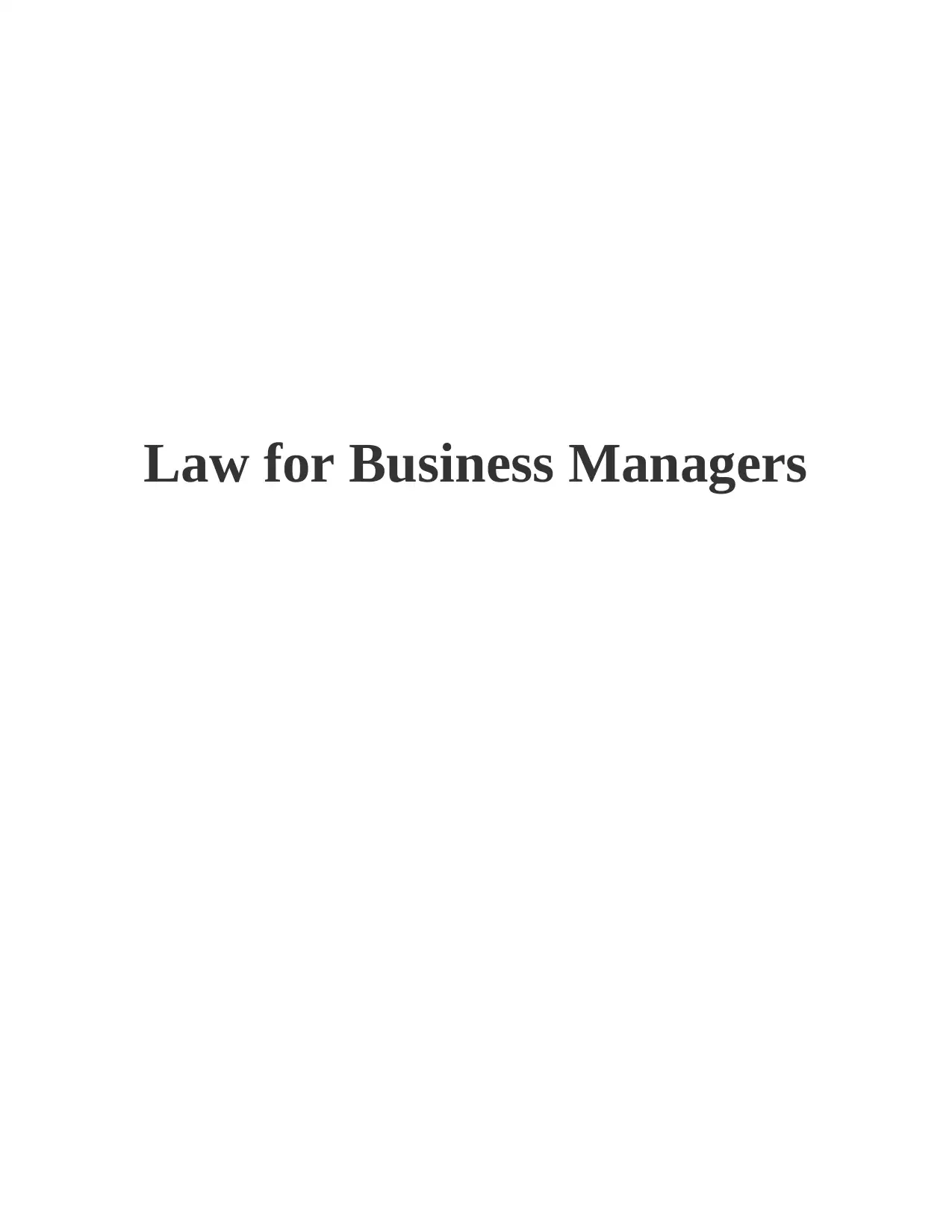
Law for Business Managers
Paraphrase This Document
Need a fresh take? Get an instant paraphrase of this document with our AI Paraphraser
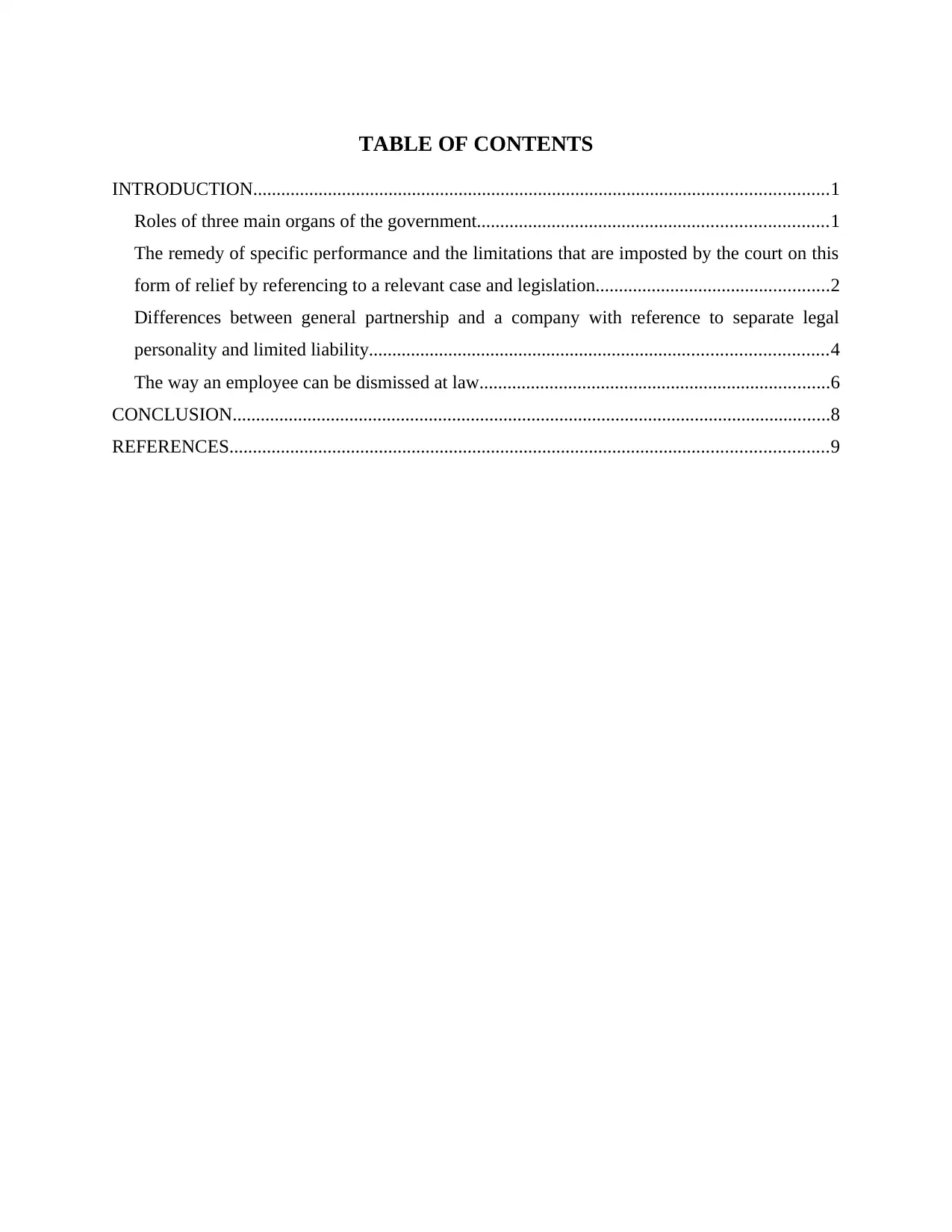
TABLE OF CONTENTS
INTRODUCTION...........................................................................................................................1
Roles of three main organs of the government...........................................................................1
The remedy of specific performance and the limitations that are imposted by the court on this
form of relief by referencing to a relevant case and legislation..................................................2
Differences between general partnership and a company with reference to separate legal
personality and limited liability..................................................................................................4
The way an employee can be dismissed at law...........................................................................6
CONCLUSION................................................................................................................................8
REFERENCES................................................................................................................................9
INTRODUCTION...........................................................................................................................1
Roles of three main organs of the government...........................................................................1
The remedy of specific performance and the limitations that are imposted by the court on this
form of relief by referencing to a relevant case and legislation..................................................2
Differences between general partnership and a company with reference to separate legal
personality and limited liability..................................................................................................4
The way an employee can be dismissed at law...........................................................................6
CONCLUSION................................................................................................................................8
REFERENCES................................................................................................................................9
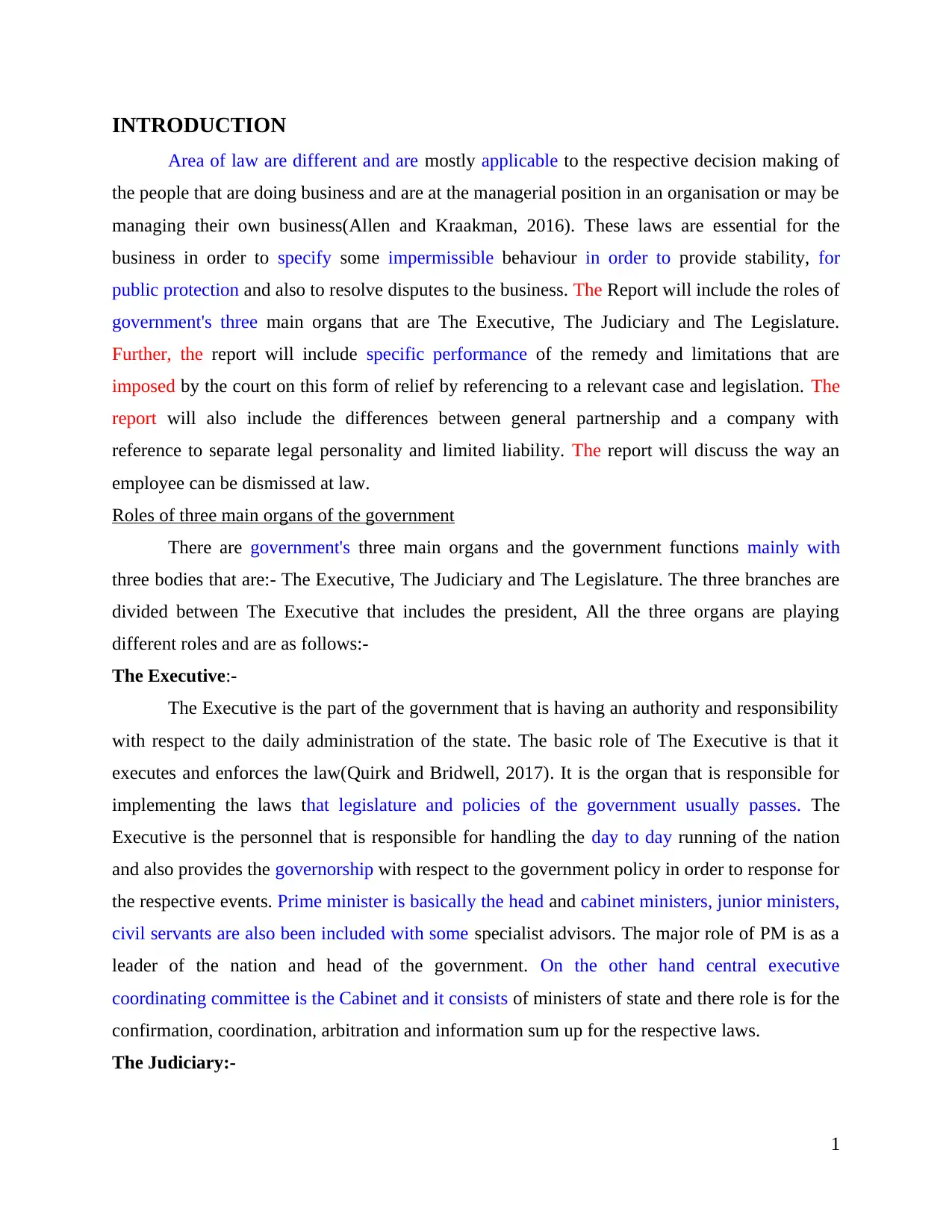
INTRODUCTION
Area of law are different and are mostly applicable to the respective decision making of
the people that are doing business and are at the managerial position in an organisation or may be
managing their own business(Allen and Kraakman, 2016). These laws are essential for the
business in order to specify some impermissible behaviour in order to provide stability, for
public protection and also to resolve disputes to the business. The Report will include the roles of
government's three main organs that are The Executive, The Judiciary and The Legislature.
Further, the report will include specific performance of the remedy and limitations that are
imposed by the court on this form of relief by referencing to a relevant case and legislation. The
report will also include the differences between general partnership and a company with
reference to separate legal personality and limited liability. The report will discuss the way an
employee can be dismissed at law.
Roles of three main organs of the government
There are government's three main organs and the government functions mainly with
three bodies that are:- The Executive, The Judiciary and The Legislature. The three branches are
divided between The Executive that includes the president, All the three organs are playing
different roles and are as follows:-
The Executive:-
The Executive is the part of the government that is having an authority and responsibility
with respect to the daily administration of the state. The basic role of The Executive is that it
executes and enforces the law(Quirk and Bridwell, 2017). It is the organ that is responsible for
implementing the laws that legislature and policies of the government usually passes. The
Executive is the personnel that is responsible for handling the day to day running of the nation
and also provides the governorship with respect to the government policy in order to response for
the respective events. Prime minister is basically the head and cabinet ministers, junior ministers,
civil servants are also been included with some specialist advisors. The major role of PM is as a
leader of the nation and head of the government. On the other hand central executive
coordinating committee is the Cabinet and it consists of ministers of state and there role is for the
confirmation, coordination, arbitration and information sum up for the respective laws.
The Judiciary:-
1
Area of law are different and are mostly applicable to the respective decision making of
the people that are doing business and are at the managerial position in an organisation or may be
managing their own business(Allen and Kraakman, 2016). These laws are essential for the
business in order to specify some impermissible behaviour in order to provide stability, for
public protection and also to resolve disputes to the business. The Report will include the roles of
government's three main organs that are The Executive, The Judiciary and The Legislature.
Further, the report will include specific performance of the remedy and limitations that are
imposed by the court on this form of relief by referencing to a relevant case and legislation. The
report will also include the differences between general partnership and a company with
reference to separate legal personality and limited liability. The report will discuss the way an
employee can be dismissed at law.
Roles of three main organs of the government
There are government's three main organs and the government functions mainly with
three bodies that are:- The Executive, The Judiciary and The Legislature. The three branches are
divided between The Executive that includes the president, All the three organs are playing
different roles and are as follows:-
The Executive:-
The Executive is the part of the government that is having an authority and responsibility
with respect to the daily administration of the state. The basic role of The Executive is that it
executes and enforces the law(Quirk and Bridwell, 2017). It is the organ that is responsible for
implementing the laws that legislature and policies of the government usually passes. The
Executive is the personnel that is responsible for handling the day to day running of the nation
and also provides the governorship with respect to the government policy in order to response for
the respective events. Prime minister is basically the head and cabinet ministers, junior ministers,
civil servants are also been included with some specialist advisors. The major role of PM is as a
leader of the nation and head of the government. On the other hand central executive
coordinating committee is the Cabinet and it consists of ministers of state and there role is for the
confirmation, coordination, arbitration and information sum up for the respective laws.
The Judiciary:-
1
⊘ This is a preview!⊘
Do you want full access?
Subscribe today to unlock all pages.

Trusted by 1+ million students worldwide
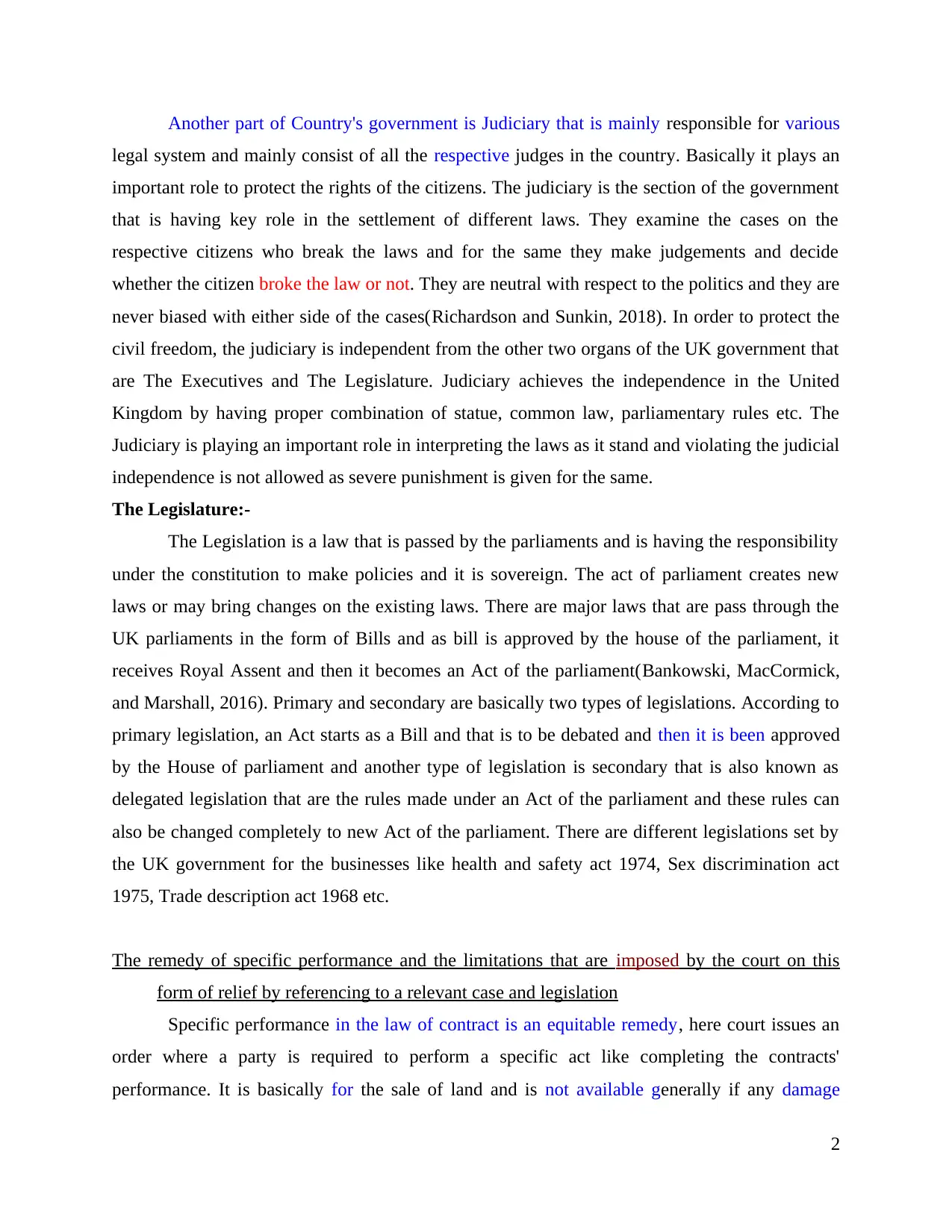
Another part of Country's government is Judiciary that is mainly responsible for various
legal system and mainly consist of all the respective judges in the country. Basically it plays an
important role to protect the rights of the citizens. The judiciary is the section of the government
that is having key role in the settlement of different laws. They examine the cases on the
respective citizens who break the laws and for the same they make judgements and decide
whether the citizen broke the law or not. They are neutral with respect to the politics and they are
never biased with either side of the cases(Richardson and Sunkin, 2018). In order to protect the
civil freedom, the judiciary is independent from the other two organs of the UK government that
are The Executives and The Legislature. Judiciary achieves the independence in the United
Kingdom by having proper combination of statue, common law, parliamentary rules etc. The
Judiciary is playing an important role in interpreting the laws as it stand and violating the judicial
independence is not allowed as severe punishment is given for the same.
The Legislature:-
The Legislation is a law that is passed by the parliaments and is having the responsibility
under the constitution to make policies and it is sovereign. The act of parliament creates new
laws or may bring changes on the existing laws. There are major laws that are pass through the
UK parliaments in the form of Bills and as bill is approved by the house of the parliament, it
receives Royal Assent and then it becomes an Act of the parliament(Bankowski, MacCormick,
and Marshall, 2016). Primary and secondary are basically two types of legislations. According to
primary legislation, an Act starts as a Bill and that is to be debated and then it is been approved
by the House of parliament and another type of legislation is secondary that is also known as
delegated legislation that are the rules made under an Act of the parliament and these rules can
also be changed completely to new Act of the parliament. There are different legislations set by
the UK government for the businesses like health and safety act 1974, Sex discrimination act
1975, Trade description act 1968 etc.
The remedy of specific performance and the limitations that are imposed by the court on this
form of relief by referencing to a relevant case and legislation
Specific performance in the law of contract is an equitable remedy, here court issues an
order where a party is required to perform a specific act like completing the contracts'
performance. It is basically for the sale of land and is not available generally if any damage
2
legal system and mainly consist of all the respective judges in the country. Basically it plays an
important role to protect the rights of the citizens. The judiciary is the section of the government
that is having key role in the settlement of different laws. They examine the cases on the
respective citizens who break the laws and for the same they make judgements and decide
whether the citizen broke the law or not. They are neutral with respect to the politics and they are
never biased with either side of the cases(Richardson and Sunkin, 2018). In order to protect the
civil freedom, the judiciary is independent from the other two organs of the UK government that
are The Executives and The Legislature. Judiciary achieves the independence in the United
Kingdom by having proper combination of statue, common law, parliamentary rules etc. The
Judiciary is playing an important role in interpreting the laws as it stand and violating the judicial
independence is not allowed as severe punishment is given for the same.
The Legislature:-
The Legislation is a law that is passed by the parliaments and is having the responsibility
under the constitution to make policies and it is sovereign. The act of parliament creates new
laws or may bring changes on the existing laws. There are major laws that are pass through the
UK parliaments in the form of Bills and as bill is approved by the house of the parliament, it
receives Royal Assent and then it becomes an Act of the parliament(Bankowski, MacCormick,
and Marshall, 2016). Primary and secondary are basically two types of legislations. According to
primary legislation, an Act starts as a Bill and that is to be debated and then it is been approved
by the House of parliament and another type of legislation is secondary that is also known as
delegated legislation that are the rules made under an Act of the parliament and these rules can
also be changed completely to new Act of the parliament. There are different legislations set by
the UK government for the businesses like health and safety act 1974, Sex discrimination act
1975, Trade description act 1968 etc.
The remedy of specific performance and the limitations that are imposed by the court on this
form of relief by referencing to a relevant case and legislation
Specific performance in the law of contract is an equitable remedy, here court issues an
order where a party is required to perform a specific act like completing the contracts'
performance. It is basically for the sale of land and is not available generally if any damage
2
Paraphrase This Document
Need a fresh take? Get an instant paraphrase of this document with our AI Paraphraser
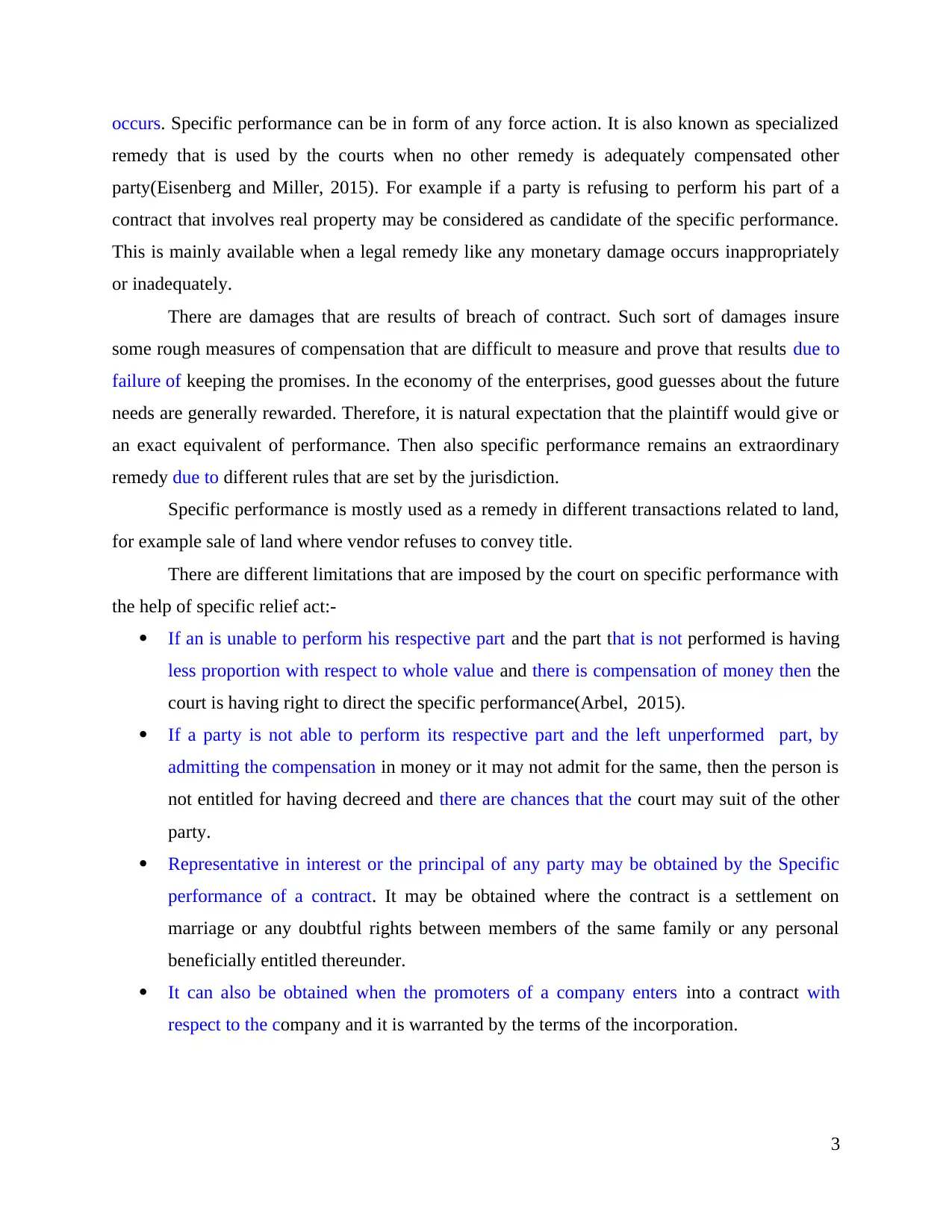
occurs. Specific performance can be in form of any force action. It is also known as specialized
remedy that is used by the courts when no other remedy is adequately compensated other
party(Eisenberg and Miller, 2015). For example if a party is refusing to perform his part of a
contract that involves real property may be considered as candidate of the specific performance.
This is mainly available when a legal remedy like any monetary damage occurs inappropriately
or inadequately.
There are damages that are results of breach of contract. Such sort of damages insure
some rough measures of compensation that are difficult to measure and prove that results due to
failure of keeping the promises. In the economy of the enterprises, good guesses about the future
needs are generally rewarded. Therefore, it is natural expectation that the plaintiff would give or
an exact equivalent of performance. Then also specific performance remains an extraordinary
remedy due to different rules that are set by the jurisdiction.
Specific performance is mostly used as a remedy in different transactions related to land,
for example sale of land where vendor refuses to convey title.
There are different limitations that are imposed by the court on specific performance with
the help of specific relief act:-
If an is unable to perform his respective part and the part that is not performed is having
less proportion with respect to whole value and there is compensation of money then the
court is having right to direct the specific performance(Arbel, 2015).
If a party is not able to perform its respective part and the left unperformed part, by
admitting the compensation in money or it may not admit for the same, then the person is
not entitled for having decreed and there are chances that the court may suit of the other
party.
Representative in interest or the principal of any party may be obtained by the Specific
performance of a contract. It may be obtained where the contract is a settlement on
marriage or any doubtful rights between members of the same family or any personal
beneficially entitled thereunder.
It can also be obtained when the promoters of a company enters into a contract with
respect to the company and it is warranted by the terms of the incorporation.
3
remedy that is used by the courts when no other remedy is adequately compensated other
party(Eisenberg and Miller, 2015). For example if a party is refusing to perform his part of a
contract that involves real property may be considered as candidate of the specific performance.
This is mainly available when a legal remedy like any monetary damage occurs inappropriately
or inadequately.
There are damages that are results of breach of contract. Such sort of damages insure
some rough measures of compensation that are difficult to measure and prove that results due to
failure of keeping the promises. In the economy of the enterprises, good guesses about the future
needs are generally rewarded. Therefore, it is natural expectation that the plaintiff would give or
an exact equivalent of performance. Then also specific performance remains an extraordinary
remedy due to different rules that are set by the jurisdiction.
Specific performance is mostly used as a remedy in different transactions related to land,
for example sale of land where vendor refuses to convey title.
There are different limitations that are imposed by the court on specific performance with
the help of specific relief act:-
If an is unable to perform his respective part and the part that is not performed is having
less proportion with respect to whole value and there is compensation of money then the
court is having right to direct the specific performance(Arbel, 2015).
If a party is not able to perform its respective part and the left unperformed part, by
admitting the compensation in money or it may not admit for the same, then the person is
not entitled for having decreed and there are chances that the court may suit of the other
party.
Representative in interest or the principal of any party may be obtained by the Specific
performance of a contract. It may be obtained where the contract is a settlement on
marriage or any doubtful rights between members of the same family or any personal
beneficially entitled thereunder.
It can also be obtained when the promoters of a company enters into a contract with
respect to the company and it is warranted by the terms of the incorporation.
3
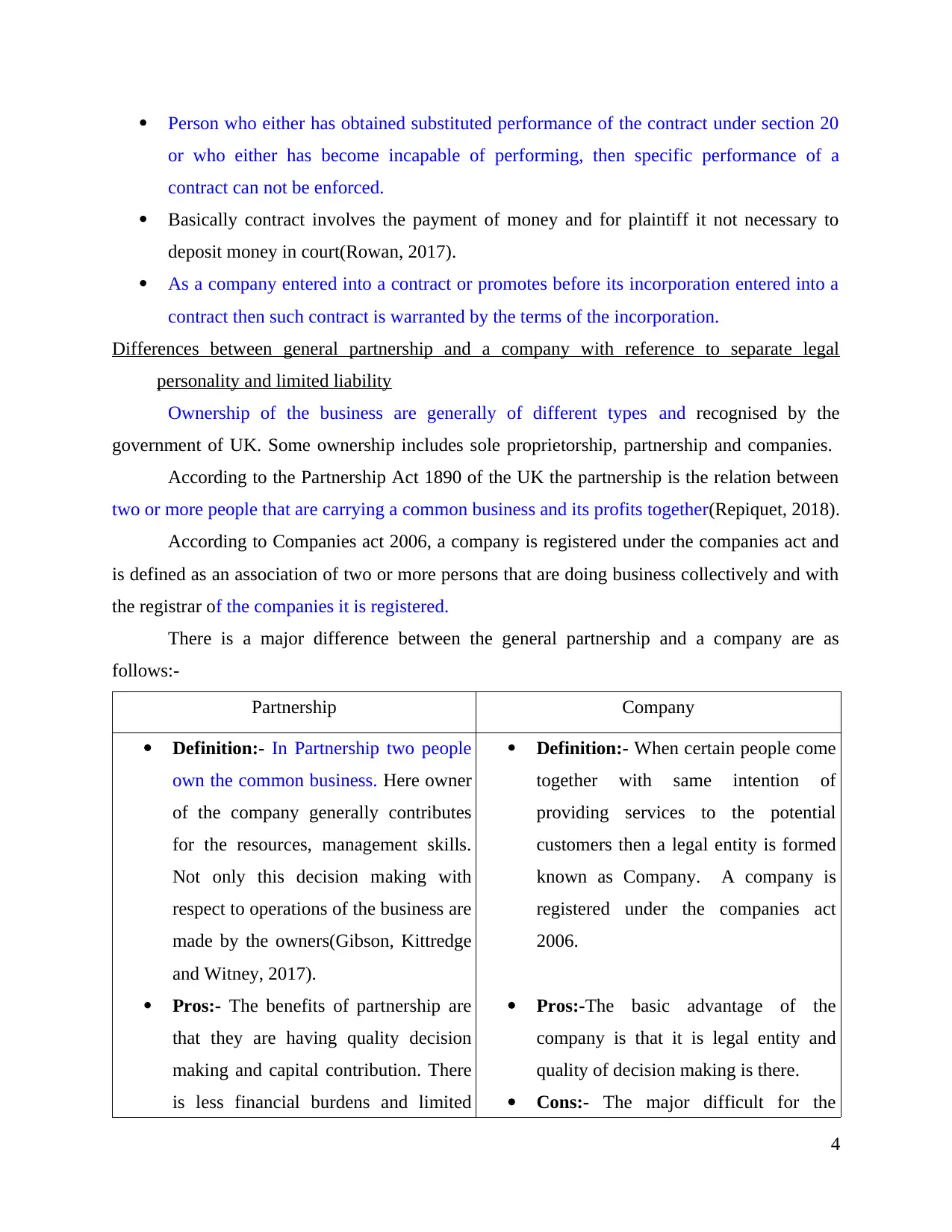
Person who either has obtained substituted performance of the contract under section 20
or who either has become incapable of performing, then specific performance of a
contract can not be enforced.
Basically contract involves the payment of money and for plaintiff it not necessary to
deposit money in court(Rowan, 2017).
As a company entered into a contract or promotes before its incorporation entered into a
contract then such contract is warranted by the terms of the incorporation.
Differences between general partnership and a company with reference to separate legal
personality and limited liability
Ownership of the business are generally of different types and recognised by the
government of UK. Some ownership includes sole proprietorship, partnership and companies.
According to the Partnership Act 1890 of the UK the partnership is the relation between
two or more people that are carrying a common business and its profits together(Repiquet, 2018).
According to Companies act 2006, a company is registered under the companies act and
is defined as an association of two or more persons that are doing business collectively and with
the registrar of the companies it is registered.
There is a major difference between the general partnership and a company are as
follows:-
Partnership Company
Definition:- In Partnership two people
own the common business. Here owner
of the company generally contributes
for the resources, management skills.
Not only this decision making with
respect to operations of the business are
made by the owners(Gibson, Kittredge
and Witney, 2017).
Pros:- The benefits of partnership are
that they are having quality decision
making and capital contribution. There
is less financial burdens and limited
Definition:- When certain people come
together with same intention of
providing services to the potential
customers then a legal entity is formed
known as Company. A company is
registered under the companies act
2006.
Pros:-The basic advantage of the
company is that it is legal entity and
quality of decision making is there.
Cons:- The major difficult for the
4
or who either has become incapable of performing, then specific performance of a
contract can not be enforced.
Basically contract involves the payment of money and for plaintiff it not necessary to
deposit money in court(Rowan, 2017).
As a company entered into a contract or promotes before its incorporation entered into a
contract then such contract is warranted by the terms of the incorporation.
Differences between general partnership and a company with reference to separate legal
personality and limited liability
Ownership of the business are generally of different types and recognised by the
government of UK. Some ownership includes sole proprietorship, partnership and companies.
According to the Partnership Act 1890 of the UK the partnership is the relation between
two or more people that are carrying a common business and its profits together(Repiquet, 2018).
According to Companies act 2006, a company is registered under the companies act and
is defined as an association of two or more persons that are doing business collectively and with
the registrar of the companies it is registered.
There is a major difference between the general partnership and a company are as
follows:-
Partnership Company
Definition:- In Partnership two people
own the common business. Here owner
of the company generally contributes
for the resources, management skills.
Not only this decision making with
respect to operations of the business are
made by the owners(Gibson, Kittredge
and Witney, 2017).
Pros:- The benefits of partnership are
that they are having quality decision
making and capital contribution. There
is less financial burdens and limited
Definition:- When certain people come
together with same intention of
providing services to the potential
customers then a legal entity is formed
known as Company. A company is
registered under the companies act
2006.
Pros:-The basic advantage of the
company is that it is legal entity and
quality of decision making is there.
Cons:- The major difficult for the
4
⊘ This is a preview!⊘
Do you want full access?
Subscribe today to unlock all pages.

Trusted by 1+ million students worldwide
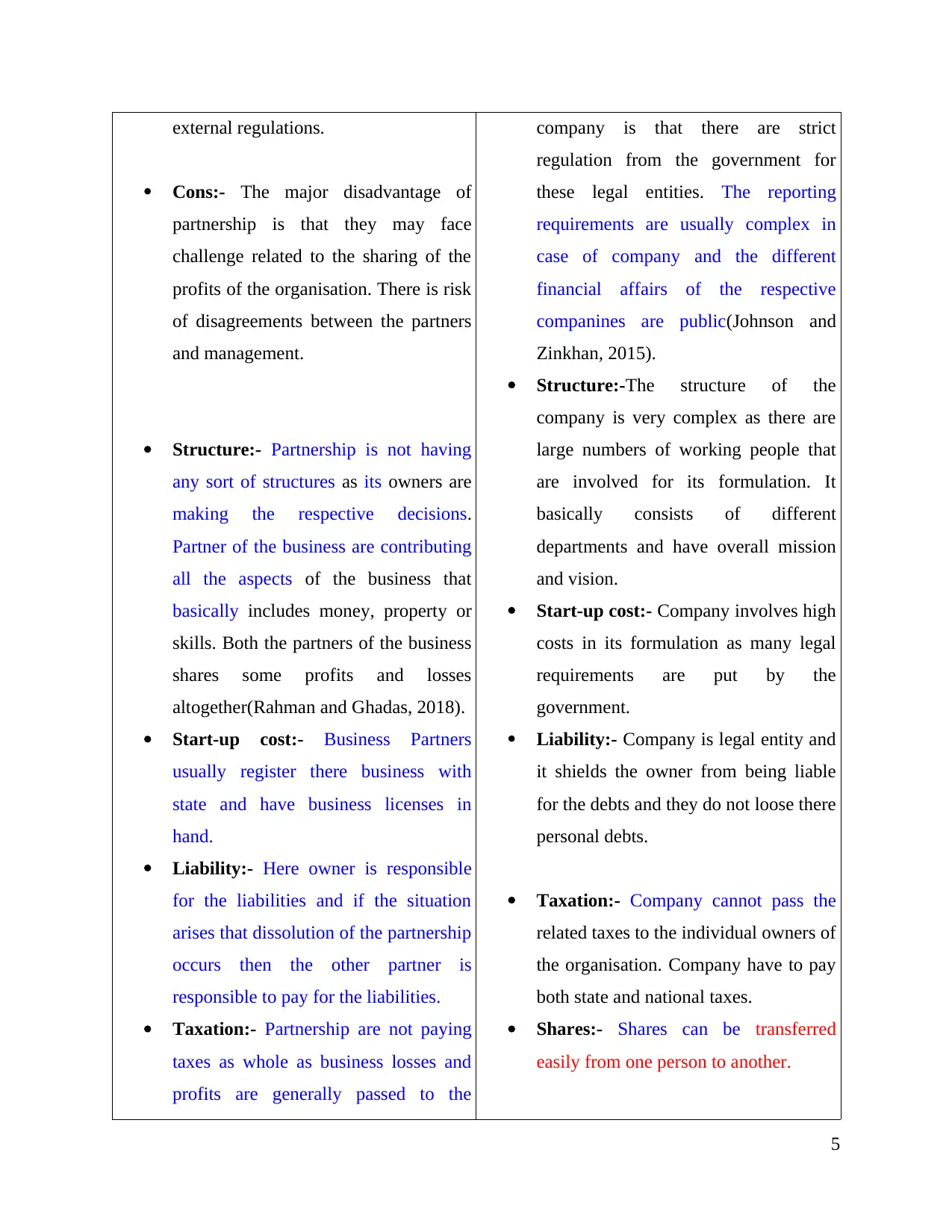
external regulations.
Cons:- The major disadvantage of
partnership is that they may face
challenge related to the sharing of the
profits of the organisation. There is risk
of disagreements between the partners
and management.
Structure:- Partnership is not having
any sort of structures as its owners are
making the respective decisions.
Partner of the business are contributing
all the aspects of the business that
basically includes money, property or
skills. Both the partners of the business
shares some profits and losses
altogether(Rahman and Ghadas, 2018).
Start-up cost:- Business Partners
usually register there business with
state and have business licenses in
hand.
Liability:- Here owner is responsible
for the liabilities and if the situation
arises that dissolution of the partnership
occurs then the other partner is
responsible to pay for the liabilities.
Taxation:- Partnership are not paying
taxes as whole as business losses and
profits are generally passed to the
company is that there are strict
regulation from the government for
these legal entities. The reporting
requirements are usually complex in
case of company and the different
financial affairs of the respective
companines are public(Johnson and
Zinkhan, 2015).
Structure:-The structure of the
company is very complex as there are
large numbers of working people that
are involved for its formulation. It
basically consists of different
departments and have overall mission
and vision.
Start-up cost:- Company involves high
costs in its formulation as many legal
requirements are put by the
government.
Liability:- Company is legal entity and
it shields the owner from being liable
for the debts and they do not loose there
personal debts.
Taxation:- Company cannot pass the
related taxes to the individual owners of
the organisation. Company have to pay
both state and national taxes.
Shares:- Shares can be transferred
easily from one person to another.
5
Cons:- The major disadvantage of
partnership is that they may face
challenge related to the sharing of the
profits of the organisation. There is risk
of disagreements between the partners
and management.
Structure:- Partnership is not having
any sort of structures as its owners are
making the respective decisions.
Partner of the business are contributing
all the aspects of the business that
basically includes money, property or
skills. Both the partners of the business
shares some profits and losses
altogether(Rahman and Ghadas, 2018).
Start-up cost:- Business Partners
usually register there business with
state and have business licenses in
hand.
Liability:- Here owner is responsible
for the liabilities and if the situation
arises that dissolution of the partnership
occurs then the other partner is
responsible to pay for the liabilities.
Taxation:- Partnership are not paying
taxes as whole as business losses and
profits are generally passed to the
company is that there are strict
regulation from the government for
these legal entities. The reporting
requirements are usually complex in
case of company and the different
financial affairs of the respective
companines are public(Johnson and
Zinkhan, 2015).
Structure:-The structure of the
company is very complex as there are
large numbers of working people that
are involved for its formulation. It
basically consists of different
departments and have overall mission
and vision.
Start-up cost:- Company involves high
costs in its formulation as many legal
requirements are put by the
government.
Liability:- Company is legal entity and
it shields the owner from being liable
for the debts and they do not loose there
personal debts.
Taxation:- Company cannot pass the
related taxes to the individual owners of
the organisation. Company have to pay
both state and national taxes.
Shares:- Shares can be transferred
easily from one person to another.
5
Paraphrase This Document
Need a fresh take? Get an instant paraphrase of this document with our AI Paraphraser
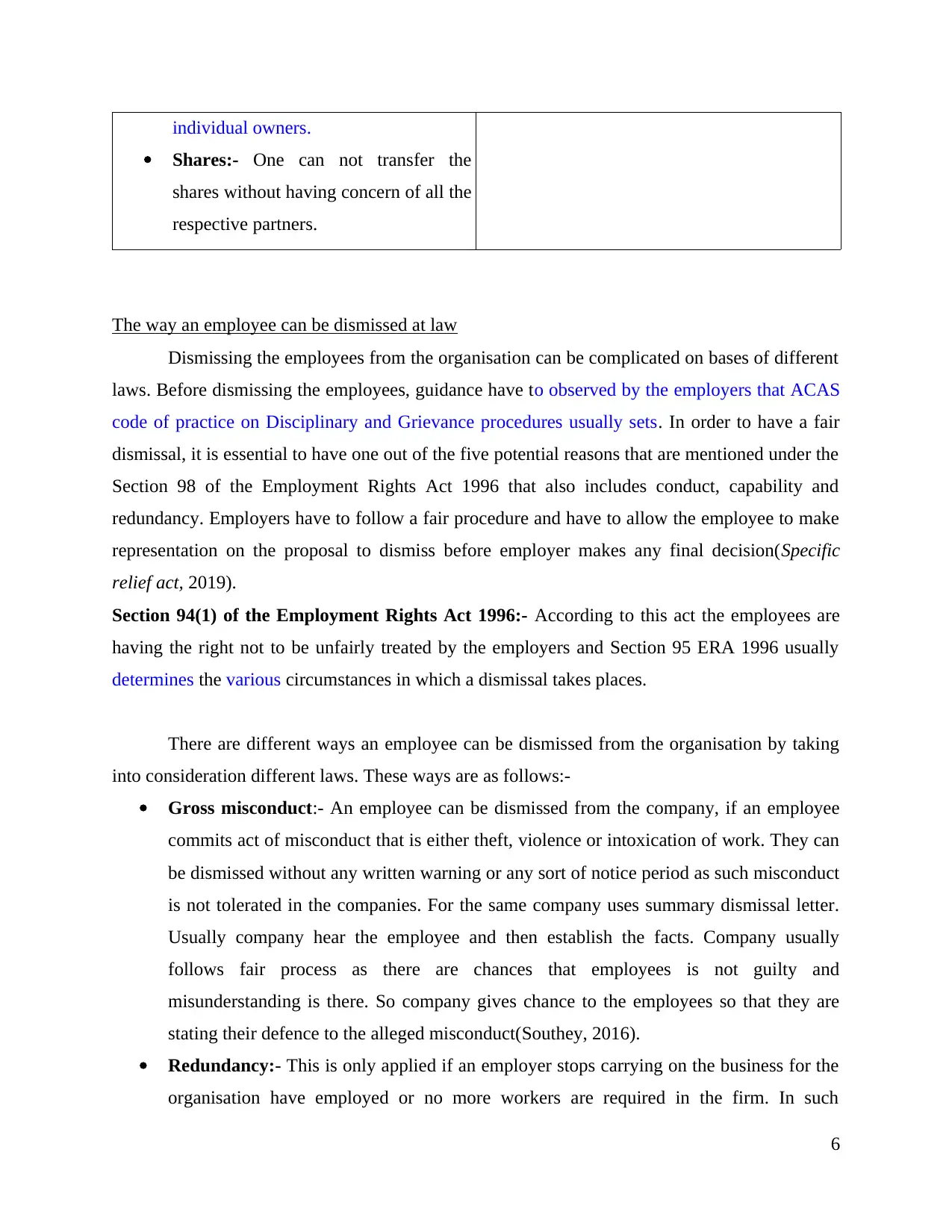
individual owners.
Shares:- One can not transfer the
shares without having concern of all the
respective partners.
The way an employee can be dismissed at law
Dismissing the employees from the organisation can be complicated on bases of different
laws. Before dismissing the employees, guidance have to observed by the employers that ACAS
code of practice on Disciplinary and Grievance procedures usually sets. In order to have a fair
dismissal, it is essential to have one out of the five potential reasons that are mentioned under the
Section 98 of the Employment Rights Act 1996 that also includes conduct, capability and
redundancy. Employers have to follow a fair procedure and have to allow the employee to make
representation on the proposal to dismiss before employer makes any final decision(Specific
relief act, 2019).
Section 94(1) of the Employment Rights Act 1996:- According to this act the employees are
having the right not to be unfairly treated by the employers and Section 95 ERA 1996 usually
determines the various circumstances in which a dismissal takes places.
There are different ways an employee can be dismissed from the organisation by taking
into consideration different laws. These ways are as follows:-
Gross misconduct:- An employee can be dismissed from the company, if an employee
commits act of misconduct that is either theft, violence or intoxication of work. They can
be dismissed without any written warning or any sort of notice period as such misconduct
is not tolerated in the companies. For the same company uses summary dismissal letter.
Usually company hear the employee and then establish the facts. Company usually
follows fair process as there are chances that employees is not guilty and
misunderstanding is there. So company gives chance to the employees so that they are
stating their defence to the alleged misconduct(Southey, 2016).
Redundancy:- This is only applied if an employer stops carrying on the business for the
organisation have employed or no more workers are required in the firm. In such
6
Shares:- One can not transfer the
shares without having concern of all the
respective partners.
The way an employee can be dismissed at law
Dismissing the employees from the organisation can be complicated on bases of different
laws. Before dismissing the employees, guidance have to observed by the employers that ACAS
code of practice on Disciplinary and Grievance procedures usually sets. In order to have a fair
dismissal, it is essential to have one out of the five potential reasons that are mentioned under the
Section 98 of the Employment Rights Act 1996 that also includes conduct, capability and
redundancy. Employers have to follow a fair procedure and have to allow the employee to make
representation on the proposal to dismiss before employer makes any final decision(Specific
relief act, 2019).
Section 94(1) of the Employment Rights Act 1996:- According to this act the employees are
having the right not to be unfairly treated by the employers and Section 95 ERA 1996 usually
determines the various circumstances in which a dismissal takes places.
There are different ways an employee can be dismissed from the organisation by taking
into consideration different laws. These ways are as follows:-
Gross misconduct:- An employee can be dismissed from the company, if an employee
commits act of misconduct that is either theft, violence or intoxication of work. They can
be dismissed without any written warning or any sort of notice period as such misconduct
is not tolerated in the companies. For the same company uses summary dismissal letter.
Usually company hear the employee and then establish the facts. Company usually
follows fair process as there are chances that employees is not guilty and
misunderstanding is there. So company gives chance to the employees so that they are
stating their defence to the alleged misconduct(Southey, 2016).
Redundancy:- This is only applied if an employer stops carrying on the business for the
organisation have employed or no more workers are required in the firm. In such
6
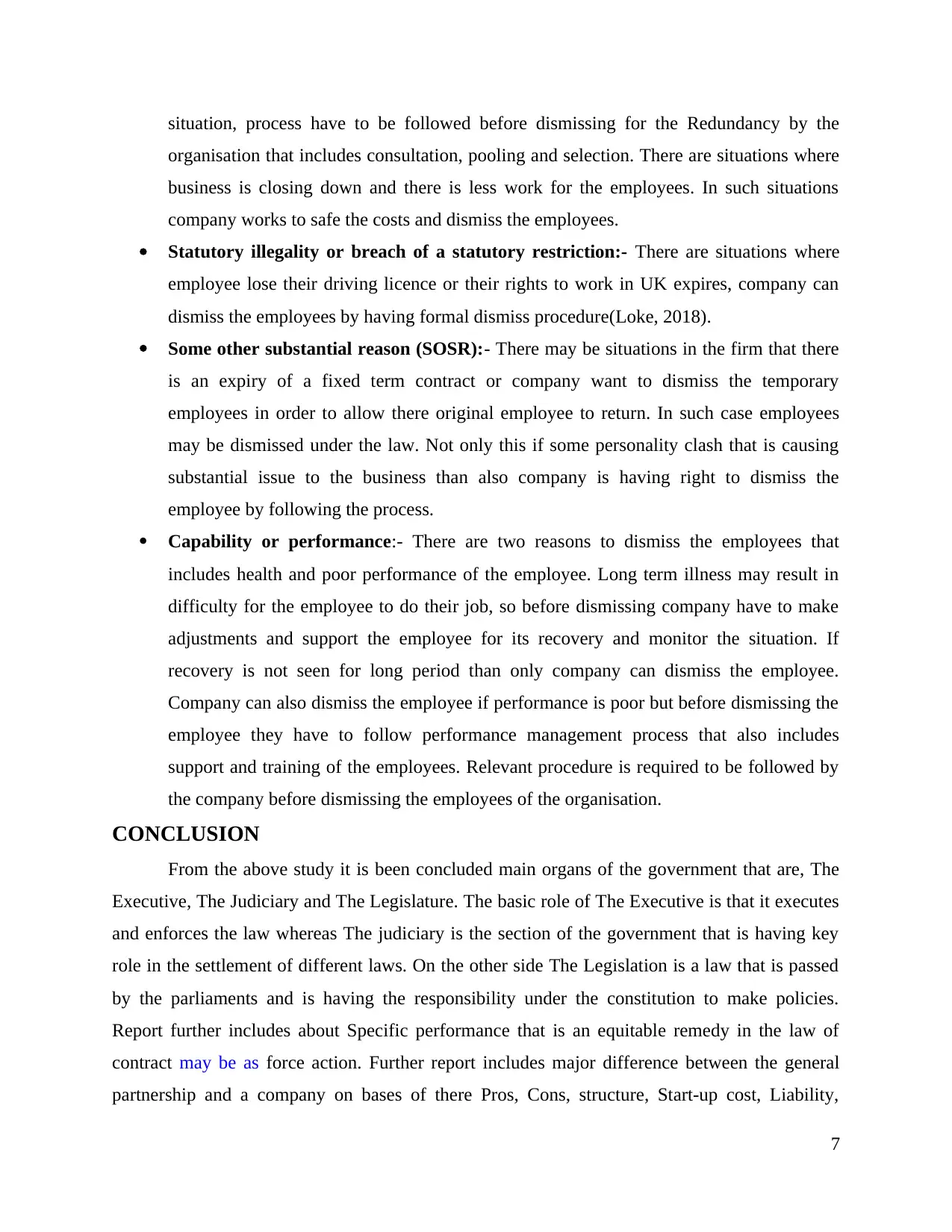
situation, process have to be followed before dismissing for the Redundancy by the
organisation that includes consultation, pooling and selection. There are situations where
business is closing down and there is less work for the employees. In such situations
company works to safe the costs and dismiss the employees.
Statutory illegality or breach of a statutory restriction:- There are situations where
employee lose their driving licence or their rights to work in UK expires, company can
dismiss the employees by having formal dismiss procedure(Loke, 2018).
Some other substantial reason (SOSR):- There may be situations in the firm that there
is an expiry of a fixed term contract or company want to dismiss the temporary
employees in order to allow there original employee to return. In such case employees
may be dismissed under the law. Not only this if some personality clash that is causing
substantial issue to the business than also company is having right to dismiss the
employee by following the process.
Capability or performance:- There are two reasons to dismiss the employees that
includes health and poor performance of the employee. Long term illness may result in
difficulty for the employee to do their job, so before dismissing company have to make
adjustments and support the employee for its recovery and monitor the situation. If
recovery is not seen for long period than only company can dismiss the employee.
Company can also dismiss the employee if performance is poor but before dismissing the
employee they have to follow performance management process that also includes
support and training of the employees. Relevant procedure is required to be followed by
the company before dismissing the employees of the organisation.
CONCLUSION
From the above study it is been concluded main organs of the government that are, The
Executive, The Judiciary and The Legislature. The basic role of The Executive is that it executes
and enforces the law whereas The judiciary is the section of the government that is having key
role in the settlement of different laws. On the other side The Legislation is a law that is passed
by the parliaments and is having the responsibility under the constitution to make policies.
Report further includes about Specific performance that is an equitable remedy in the law of
contract may be as force action. Further report includes major difference between the general
partnership and a company on bases of there Pros, Cons, structure, Start-up cost, Liability,
7
organisation that includes consultation, pooling and selection. There are situations where
business is closing down and there is less work for the employees. In such situations
company works to safe the costs and dismiss the employees.
Statutory illegality or breach of a statutory restriction:- There are situations where
employee lose their driving licence or their rights to work in UK expires, company can
dismiss the employees by having formal dismiss procedure(Loke, 2018).
Some other substantial reason (SOSR):- There may be situations in the firm that there
is an expiry of a fixed term contract or company want to dismiss the temporary
employees in order to allow there original employee to return. In such case employees
may be dismissed under the law. Not only this if some personality clash that is causing
substantial issue to the business than also company is having right to dismiss the
employee by following the process.
Capability or performance:- There are two reasons to dismiss the employees that
includes health and poor performance of the employee. Long term illness may result in
difficulty for the employee to do their job, so before dismissing company have to make
adjustments and support the employee for its recovery and monitor the situation. If
recovery is not seen for long period than only company can dismiss the employee.
Company can also dismiss the employee if performance is poor but before dismissing the
employee they have to follow performance management process that also includes
support and training of the employees. Relevant procedure is required to be followed by
the company before dismissing the employees of the organisation.
CONCLUSION
From the above study it is been concluded main organs of the government that are, The
Executive, The Judiciary and The Legislature. The basic role of The Executive is that it executes
and enforces the law whereas The judiciary is the section of the government that is having key
role in the settlement of different laws. On the other side The Legislation is a law that is passed
by the parliaments and is having the responsibility under the constitution to make policies.
Report further includes about Specific performance that is an equitable remedy in the law of
contract may be as force action. Further report includes major difference between the general
partnership and a company on bases of there Pros, Cons, structure, Start-up cost, Liability,
7
⊘ This is a preview!⊘
Do you want full access?
Subscribe today to unlock all pages.

Trusted by 1+ million students worldwide

Taxation and also Shares. At the end report concludes that there are different ways an employee
can be dismissed from the organisation that is on basis of Gross misconduct, Redundancy,
Statutory illegality or breach of a statutory restriction, Some other substantial reason and
Capability or performance of the employee.
8
can be dismissed from the organisation that is on basis of Gross misconduct, Redundancy,
Statutory illegality or breach of a statutory restriction, Some other substantial reason and
Capability or performance of the employee.
8
Paraphrase This Document
Need a fresh take? Get an instant paraphrase of this document with our AI Paraphraser
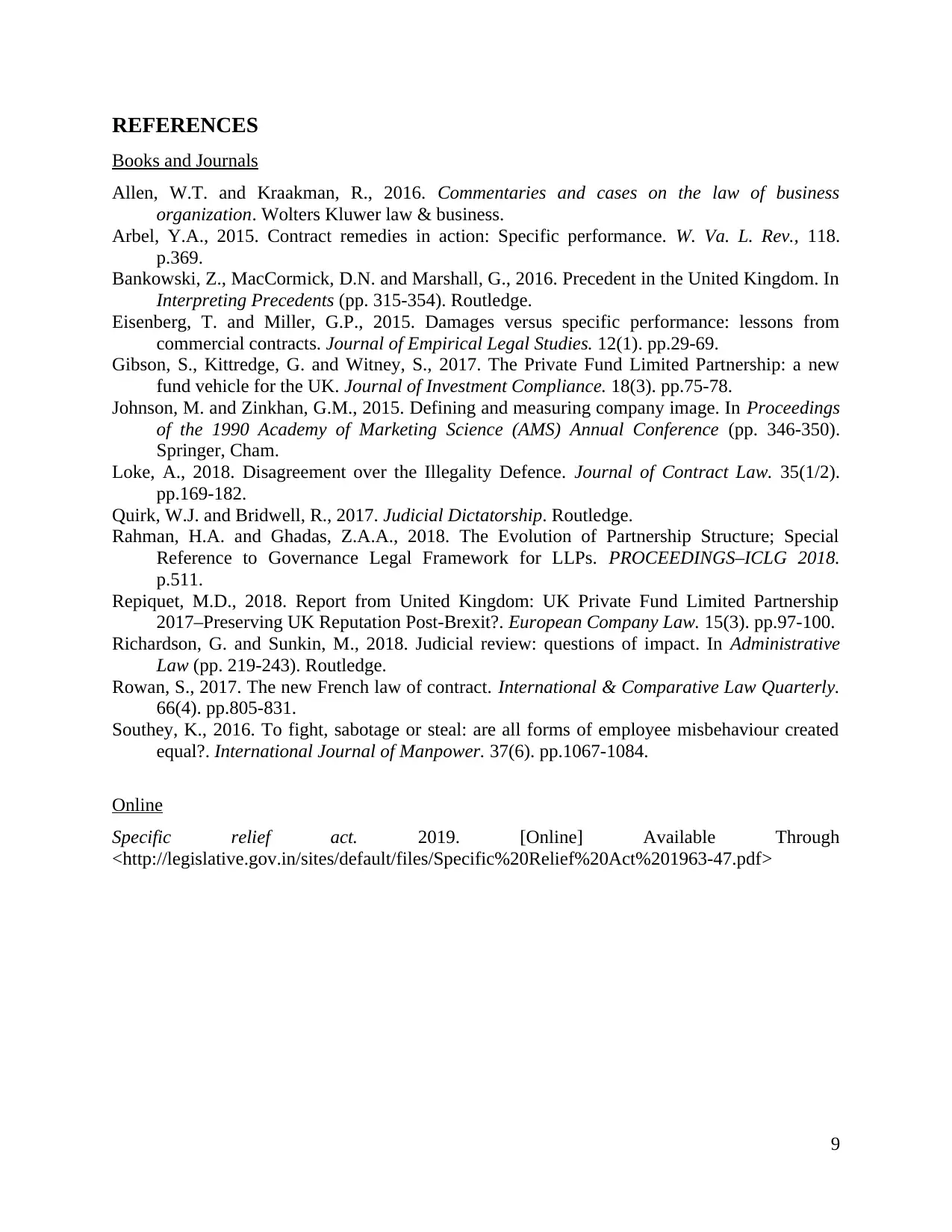
REFERENCES
Books and Journals
Allen, W.T. and Kraakman, R., 2016. Commentaries and cases on the law of business
organization. Wolters Kluwer law & business.
Arbel, Y.A., 2015. Contract remedies in action: Specific performance. W. Va. L. Rev., 118.
p.369.
Bankowski, Z., MacCormick, D.N. and Marshall, G., 2016. Precedent in the United Kingdom. In
Interpreting Precedents (pp. 315-354). Routledge.
Eisenberg, T. and Miller, G.P., 2015. Damages versus specific performance: lessons from
commercial contracts. Journal of Empirical Legal Studies. 12(1). pp.29-69.
Gibson, S., Kittredge, G. and Witney, S., 2017. The Private Fund Limited Partnership: a new
fund vehicle for the UK. Journal of Investment Compliance. 18(3). pp.75-78.
Johnson, M. and Zinkhan, G.M., 2015. Defining and measuring company image. In Proceedings
of the 1990 Academy of Marketing Science (AMS) Annual Conference (pp. 346-350).
Springer, Cham.
Loke, A., 2018. Disagreement over the Illegality Defence. Journal of Contract Law. 35(1/2).
pp.169-182.
Quirk, W.J. and Bridwell, R., 2017. Judicial Dictatorship. Routledge.
Rahman, H.A. and Ghadas, Z.A.A., 2018. The Evolution of Partnership Structure; Special
Reference to Governance Legal Framework for LLPs. PROCEEDINGS–ICLG 2018.
p.511.
Repiquet, M.D., 2018. Report from United Kingdom: UK Private Fund Limited Partnership
2017–Preserving UK Reputation Post-Brexit?. European Company Law. 15(3). pp.97-100.
Richardson, G. and Sunkin, M., 2018. Judicial review: questions of impact. In Administrative
Law (pp. 219-243). Routledge.
Rowan, S., 2017. The new French law of contract. International & Comparative Law Quarterly.
66(4). pp.805-831.
Southey, K., 2016. To fight, sabotage or steal: are all forms of employee misbehaviour created
equal?. International Journal of Manpower. 37(6). pp.1067-1084.
Online
Specific relief act. 2019. [Online] Available Through
<http://legislative.gov.in/sites/default/files/Specific%20Relief%20Act%201963-47.pdf>
9
Books and Journals
Allen, W.T. and Kraakman, R., 2016. Commentaries and cases on the law of business
organization. Wolters Kluwer law & business.
Arbel, Y.A., 2015. Contract remedies in action: Specific performance. W. Va. L. Rev., 118.
p.369.
Bankowski, Z., MacCormick, D.N. and Marshall, G., 2016. Precedent in the United Kingdom. In
Interpreting Precedents (pp. 315-354). Routledge.
Eisenberg, T. and Miller, G.P., 2015. Damages versus specific performance: lessons from
commercial contracts. Journal of Empirical Legal Studies. 12(1). pp.29-69.
Gibson, S., Kittredge, G. and Witney, S., 2017. The Private Fund Limited Partnership: a new
fund vehicle for the UK. Journal of Investment Compliance. 18(3). pp.75-78.
Johnson, M. and Zinkhan, G.M., 2015. Defining and measuring company image. In Proceedings
of the 1990 Academy of Marketing Science (AMS) Annual Conference (pp. 346-350).
Springer, Cham.
Loke, A., 2018. Disagreement over the Illegality Defence. Journal of Contract Law. 35(1/2).
pp.169-182.
Quirk, W.J. and Bridwell, R., 2017. Judicial Dictatorship. Routledge.
Rahman, H.A. and Ghadas, Z.A.A., 2018. The Evolution of Partnership Structure; Special
Reference to Governance Legal Framework for LLPs. PROCEEDINGS–ICLG 2018.
p.511.
Repiquet, M.D., 2018. Report from United Kingdom: UK Private Fund Limited Partnership
2017–Preserving UK Reputation Post-Brexit?. European Company Law. 15(3). pp.97-100.
Richardson, G. and Sunkin, M., 2018. Judicial review: questions of impact. In Administrative
Law (pp. 219-243). Routledge.
Rowan, S., 2017. The new French law of contract. International & Comparative Law Quarterly.
66(4). pp.805-831.
Southey, K., 2016. To fight, sabotage or steal: are all forms of employee misbehaviour created
equal?. International Journal of Manpower. 37(6). pp.1067-1084.
Online
Specific relief act. 2019. [Online] Available Through
<http://legislative.gov.in/sites/default/files/Specific%20Relief%20Act%201963-47.pdf>
9
1 out of 11
Related Documents
Your All-in-One AI-Powered Toolkit for Academic Success.
+13062052269
info@desklib.com
Available 24*7 on WhatsApp / Email
![[object Object]](/_next/static/media/star-bottom.7253800d.svg)
Unlock your academic potential
Copyright © 2020–2025 A2Z Services. All Rights Reserved. Developed and managed by ZUCOL.





